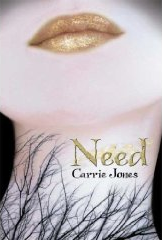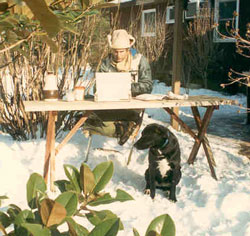Archive for 2008
Inteview with Carrie Jones
 Straight up, I adore Carrie Jones. She’s clever, compassionate, funny and a damned good writer so when I heard she had a new book coming out I used it as an excuse to interview her 😉 Enjoy!
Straight up, I adore Carrie Jones. She’s clever, compassionate, funny and a damned good writer so when I heard she had a new book coming out I used it as an excuse to interview her 😉 Enjoy!
Can you tell Niteblade readers a little bit about NEED?
Sure. Zara is a Charleston runner who collects phobia. She never knew her real dad. Her stepfather just died. Her mom is mourning big time and she’s sent Zara to live with her grandmother in Maine so she can recover and stay “Safe.” Zara doesn’t think she’s in danger; she thinks her mother just can’t deal.
Wrong. Turns out that guy she sees everywhere, the one leaving trails of gold glitter, isn’t a figment of her imagination or some random stalker. He’s a pixie—and not the cute, lovable kind with wings who hangs out with Peter Pan. He’s the kind who has dreadful, uncontrollable needs. And he’s trailing Zara.
She also falls in massive like with a guy named Nick so there’s some romance thrown in, because I am all about the love connection. 😉
And that cover! Oh my goodness, it’s awesome. Did you squeal with delight when you first saw it?
Oh! Thank you for liking it. Yeah, I pretty much passed out when I saw it. The cat revived me by pawing my hair. Then I hyperventilated. Then I sort of staggered around the kitchen explaining to the dog how cool it all was. The dog wagged her tail, but I think she was just humoring me because she was hoping for some fine beef-flavored doggy treats.
I’m sure that somewhere in there I squealed so loudly that people in Oklahoma could hear it. I do know the police were called.
There was a story you told on one of the blogs you post at, about the man who inspired your pixie. I have been trying to think of a clever way to ‘trick’ you into telling it again, but I fail. Will you please share that with us here?
I was at the Common Ground Fair, which is this huge, cool fair in Maine that’s sponsored by Maine Organic Farmers and Growers Association (MOFGA). To get to the main part of the fair you have to walk about a half mile through this sweet trail that curves through these tall spruce trees.
Right in front of me was this guy. He had a weird vibe. He was wearing all corduroy – blazer, pants. And sticking out from his blazer was this long tail-like appendage that was wrapped in different colored earth-toned cloth. I guess he could tell I was checking him out because he turned his head and looked at me. His eye was this startling silver color.
How startling? So startling that I actually gasped and got creeped out.
Then when we were in line to pay we made eye contact again and his eyes were brown.
I know! I know! I probably imagined the silver eye color.
It doesn’t matter. That was one of the main things that got me started. Then, I just had this image of a man standing outside an airport pointing at an airplane this girl was on.
It also creeped me out.
So, I started writing.
Did you find it difficult to go from writing realistic fiction to writing NEED where you’ve still got the ‘normal world’ but enhanced with magic?
I’ve always loved magically enhanced worlds, so for me it was this massive pleasure to be able to try to write NEED. The hardest part was going from really character-propelled writing to a more plot-based writing with so many external elements. My first three books were really focused on internal changes.
That was also why it was so much fun to try. I get bored sooooo easily and NEED was an experiment really. I wanted to see if I could do it. Hopefully I did.
It seems to me that comparisons between NEED and Twilight are inevitable. How does that make you feel?
It makes me feel a whole lot of complex things.
I’m honored because TWILIGHT is such a compelling read and lost of people adore it. I mean I think it’s amazing to have my book mentioned in the same breath as a book that people love so intensely.
The comparisons also worry me because I don’t want people to expect Zara to be the same as Bella. Zara has really different motivations than Bella and a really different character. She wants so badly to conquer her fears and to be a hero. She’s not someone who is easily satisfied. So, I worry that because of the comparisons TWILIGHT fans will read NEED and think: Zara is so not Bella. Yuck. I think that would give Zara hurt feelings.
Finally, I’m frustrated because there’s a whole series of literature before TWILIGHT that NEED could also be compared to and that TWILIGHT could be compared to. There’s a lot of books about girls being thrust out of their element and put some place different and scary and cold (or wet for TWILIGHT). Gothic romances abound with it. I worry that people are forgetting the literature of before, the literature that influenced NEED and TWILIGHT and so many other books. I want those books to be honored and not forgotten.
What was your favorite thing about writing NEED? The most challenging?
I loved finding out what was going to happen next and I loved the challenge of writing from a plot-suspense perspective.
The hardest part was ending the book. I didn’t want to end it. I wanted to keep writing it.
While I can’t imagine NEED not being a resounding success, I bet you’re incredibly nervous, what are you doing to try and stay sane?
You are way too nice to me, but thank you. Well, seriously, I can REALLY imagine it not being a success at all, so I am beyond scared.
I think I’m pretty far from sane normally, I mean, I do have my dog and cat post blog entries for me. The way I keep from totally losing it and not running naked down the Main Street of Ellsworth, Maine screaming “I’m a sucky writer and please don’t flush my book down your toilet” is:
1. I pretend it’s not happening.
2. I pretend it’s not happening more.
3. I refuse to self google.
4. I work REALLY hard on this super secret project I’ve got going.
Is there anything else you’d like to add?
Just thank you so much for interviewing me. It was really kind of you, and to thank people for reading the whole interview. That was really kind of them.
While I can’t speak for everyone reading this interview, I have to say I enjoyed conducting it and I hope we’ll be able to do another someday. Good luck for lots of sales and for staying sane 🙂
Need hits the shelves today. Today. So if you’re intrigued you can pick up a copy for yourself 🙂
Interview With David Drake
 One thing I learned while attending the World Fantasy Convention in Calgary this October was that I wasn’t nearly as well read in the genre as I thought. One person I didn’t know of and hadn’t read before going to the con was David Drake, however, by the time I left I was a fan — and I hadn’t read a word he’d written yet.
One thing I learned while attending the World Fantasy Convention in Calgary this October was that I wasn’t nearly as well read in the genre as I thought. One person I didn’t know of and hadn’t read before going to the con was David Drake, however, by the time I left I was a fan — and I hadn’t read a word he’d written yet.
It started with a panel. The panel was meant to address the question ‘Is fantasy an inherently violent genre?’. I didn’t actually care about the issue, to be honest, I was going to listen to another man I’d become a fan of (without reading any of his work or seeing a single one of the movies made from his books), David Morrell. As it turns out only David Morrell and David Drake showed up, the other half of the panel were MIA.
Mr. Morrell and Mr. Drake quickly dealt with the panel question (the answer, it turns out, is no btw 😉 ) and began to have a discussion. They talked about war, combat, conditioning…so many things. It was a profound experience for me, listening to them, and I was not alone, everyone I spoke to about that panel agreed.
Later I made a point of going to listen to Mr. Drake read from his latest work-in-progress. I loved the fact he was reading from a marked-up draft of his work. When I came home I ordered The Complete Hammer’s Slammers Volume 1from Amazon. However, as you can tell, I was a fan before I ever read a word.
You can imagine how pleased I was then, when David agreed to answer a few questions for Niteblade.
Or maybe you can’t.
I came to your work very late, I’m afraid, but I’m trying to make up for lost time. I’ve just about finished “The Complete Hammer’s Slammers Volume 1” and even though I don’t usually read military sci-fi, I’m really enjoying it. One of my favorite aspects of these stories is that there are never clear-cut good guys or bad guys and very rarely a happy ending for anyone. Was that a conscious choice on your part or just the natural result of writing about war?
I don’t preach. That is, I was telling stories. In the situations I wrote about in my Military SF (which I’ll abbreviate MSF from here on out), people were making hard decisions and frequently trying very hard to kill other people, but they didn’t hate the people they were fighting. They didn’t know anything about them except the blur in their sight picture.
When I was in Viet Nam in 1970, we mostly ran into NVA because the VC had been pretty well destroyed in Tet of ’68. I didn’t hate them, but I won’t pretend I had any positive feelings about them.
A few years ago I read the novelized memoir of an NVA veteran (The Sorrow of War by Bao Ninh). For the first time I had a feeling of what it was like to have us as the enemy. The troops were worse treated by their government than we were by ours, and the survivors were ostracized in a much more brutal fashion by the civilians they returned to. Mind, there weren’t many survivors: the author was, typically, the only man of his 500-man battalion who came back.
Knowing our similarity wouldn’t have made any difference in 1970, to me or him either one. We both had a job to do.
In the afterward of “The Complete Hammer’s Slammers Volume 1” you talk about following the truth of your vision and in conclusion you say “And I don’t believe any writer can have real success unless he follows his own truth.“. A lot of aspiring writers read this blog, so I ask on their behalf, how do you learn to recognize your truth? How did you recognize yours?
I guess the short answer is: if you change something you’ve written because ‘it’ll never sell if I tell what really would happen,’ then you’ve identified your own truth. (And are planning to lie instead, of course.)
But in all honesty, I never thought of it that way. I didn’t realize that the early Hammer stories were unpalatable when I wrote them. I didn’t even realize that after they failed to sell for a year and a half. It was only on cool reflection (which, trust me, I wasn’t doing much of in 1973) that people were really appalled at being shown what had been our daily reality in Viet Nam.
The other thing is, however: if I’d written ordinary adventure stories as I started out doing, I’d be completely forgotten today. The reason the Hammer stories have been continuously in print for so long is that I really did tell the (my) truth.
I’ve only just begun reading “Lord of the Isles” which I understand is the first in a trilogy of trilogies called the Isles Series. Is that right? Can you tell us a little bit about the series?
There are nine books in the Isles series, right. There’s an arc, but you should be able to pick up any of the first six and read it without losing much of anything. I reintroduce the main characters in action in each.
The last three are a true trilogy: that is, elements are introduced in The Fortress of Glass, which are amplified in The Mirror of Worlds, and resolved (with a bang, if I may say so) in The Gods Return. But you really can read even those three alone or out of order. It works a lot better if they’re consecutive, though.
Remember that I wrote only short fiction for the first 12 years since I started selling. I couldn’t assume anybody who read (say) the October, 1976, issue of Galaxy would have already read the October, 1974, issue. Likewise with books in a store.
Basically, the Isles series is a Tolkienesque fantasy where the background is the Mediterranean Region during Classical times rather Northern Europe during the Middle Ages (my background as opposed to Tolkien’s). The four viewpoint characters are struggling to unite the human world against Evil which is just as fragmented as the forces of Good are, but which is generally inhuman.
I didn’t want a lot of scenes of tens of thousands of people slaughtering tens of thousands of other people. I’ve written that sort of story and I may do so again–but in the fantasies, the opponents can be demons or lichs or very large insects. I prefer that.
Hmm. I would’ve preferred that in 1970 too. Here I have the option.
The last book in the series, “The Gods Return” was recently released, can you tell us a little bit about it?
Gods wraps up the series, but more important it wraps up the final trilogy. I would hate for people to read the first seven books and be so horrified by one of the scenes in Fortress that they stopped there. (And I fear that may have happened.) There was a lot of ‘How could you do that?’ from readers.
Before I turned in the seventh book, I heard my editor on a panel say that, ‘This trilogy may not be the end of the series.’ I told him he was wrong: there’s no way to continue the Isles in any similar fashion beyond the end of Gods. This is a real climax/conclusion.
But I leave everybody (and their world) in a better place than any of them have been before.
How does it feel to finish the series off? Do you think you’re going to miss it?
A friend asked me if I felt relief when Gods came out. I realized I hadn’t thought (much) about the book in a year. I’d written a space opera and started an entirely new fantasy series since I shipped Gods off.
I’ve written a lot of books. I like most of them, and I like the Isles series a great deal. But I’m looking ahead, not back.
You say that writing heroic fantasy is good for your soul, why do you think that is? Is that why the WIP I was lucky enough to hear you read at WFC is fantasy-based?
I don’t want to write only fantasy, but switching from one genre to another (currently, from fantasy to space opera and back again) keeps me fresh and excited about what I’m doing. I did two of the Isles series back to back, and it felt like I’d been shoving a very big boulder uphill by the time I’d finished. I swore I’d never do that again–and I haven’t.
But changing off this way means that The Gods Return is just as fresh and fun to write as Lord of the Isles was back in 1995. (And boy, isn’t that a remarkably long time ago!)
One thing I’ve got to ask, why do you do all your writing outside?
Ah. Well, a variety of reasons. I haven’t driven a car since 1986 either (and that was to carry Larry Niven to the airport with his luggage); I get places on a motorcycle if I’m on my own. I just like having wide visibility.
I have wrens and finches land on me, sometimes. I get pooped on by hummingbirds. I watch frogs stalk and devour webworms (and stalk a skink, before getting a very unpleasant surprise when it tried to devour said poisonous reptile).
Think of me as being One with Nature. And okay, I’m weird. But I’m weird in a good way. (That one, at least.)
I think ‘normal’ is greatly overrated, so here’s to being weird in a good way 🙂 Thank you very much for answering my questions.
If you’d like to find out more about David Drake and the books he’s written (far too many for me to list here), you can check him out on the web at http://www.david-drake.com . On a related note, David talks a bit more about truth (and commercialism) in his most recent newsletter @ http://david-drake.com/newsarchive/news48.html
Enjoy. 🙂